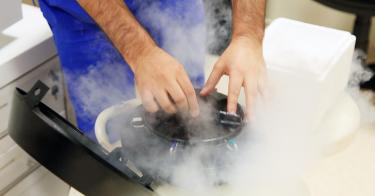Do human embryos deserve the same protections as human beings?
This is the question that drove three sets of parents—whose embryonic children were destroyed at an Alabama hospital's fertility clinic—to sue the clinic and hospital under the state’s Wrongful Death of a Minor Act. On February 16, the Alabama Supreme Court released a 7–2 landmark decision in favor of protecting embryonic human life from destruction.
These three sets of parents had created embryos through in vitro fertilization (IVF) with the hopes of conceiving children despite their struggles with infertility. An Alabama clinic was responsible for preserving embryonic children in a subzero cryopreservation facility while the parents and embryos awaited implantation. One day in 2020, a patient from the hospital wandered into the storage area, which was unsecured. The patient unwittingly picked up the embryo container and suffered severe freezer-burn, which made the patient drop the container. Unfortunately, the embryonic children were destroyed the moment their container shattered on the ground.
The parents were devastated. In two different lawsuits, they sought to sue both the fertility clinic and hospital for the wrongful death of their children and for the negligent actions of the clinic.
>>> Alabama Embryo Ruling Brings Much-Needed Regulation to Fertility Industry
The trial court, at the behest of the fertility clinic and hospital, dismissed the parent’s case. That court claimed that “[extrauterine embryo] is not a minor child, but is instead property.” The trial court went on to argue that the “. . . cryopreserved, in vitro embryos involved in this case do not fit within the definition of a ‘person' or ‘child,' and it therefore held that their loss could not give rise to a wrongful-death claim.” The claim that the embryonic children were not persons, but rather objects or “property,” added insult to injury.
Thankfully, the Alabama Supreme Court reversed this ruling. In a powerful opinion by Justice Jay Mitchell and a concurring opinion by Chief Justice Tom Parker, the court argued that “the Wrongful Death of a Minor Act applies to all unborn children, regardless of their location.”
In his concurring opinion, Parker applied the state’s laws about the sanctity of human life to the sanctity of unborn life, too. His opinion relied heavily on the theological and moral belief that children, no matter how small, have inherent worth and dignity. “In summary,” he argues,
the theologically based view of the sanctity of life adopted by the People of Alabama encompasses the following: (1) God made every person in His image; (2) each person therefore has a value that far exceeds the ability of human beings to calculate; and (3) human life cannot be wrongfully destroyed without incurring the wrath of a holy God, who views the destruction of His image as an affront to Himself.
Regardless of one’s moral views on whether IVF should be practiced at all, this decision rightly declares that clinics that do practice IVF and embryo cryopreservation must place the well-being of the children front and center. Moreover, Chief Justice Parker recognizes that each child deserves the full force of the law’s protections.
In his dissenting opinion, Justice Greg Cook argued that such a ruling “will have disastrous consequences for the in vitro fertilization industry in Alabama.” But these concerns, as Chief Justice Parker stated in his concurring opinion, are misplaced.
>>> Baby Makes Three
The court’s decision does not prohibit IVF, nor does it directly prohibit the destruction of embryos. It does, however, extend personhood to embryonic children and provide parents with legal recourse if they believe that the fertility clinic, through careless actions, is responsible for the wrongful death of their child. In the aftermath of the decision, three Alabama fertility clinics have decided to suspend treatments for the time being; this suggests that these clinics are concerned that they are not providing the best possible care for the embryos.
The harsh reality is, of course, that IVF treatments routinely create a surplus of embryos for the purpose of testing and selecting the best ones. The unwanted embryos are then destroyed or left in a frozen state indefinitely.
This destructive method may be the most common way to practice IVF, but it is certainly not the only way. Louisiana, for example, passed a state law in 1986 that prohibits the destruction of embryonic children, and IVF continues to function within these boundaries.
Indeed, many countries regulate IVF, ensuring that children receive the best possible care. Italy prohibits the freezing of human embryos except in rare circumstances, and Germany limits how many embryos can be created at a given time to 2–3. Alabama—and other states—should consider similar laws to ensure that this decision does not further contribute to the more than one million embryos frozen in the United States.
This piece originally appeared in First Things




